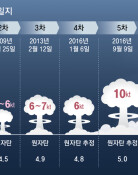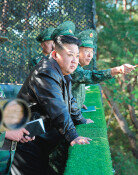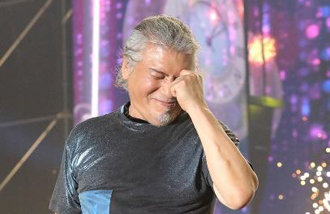5-nation talks called for to ensure thorough implementation of UN sanctions on N. Korea
5-nation talks called for to ensure thorough implementation of UN sanctions on N. Korea
Posted March. 04, 2016 07:04,
Updated March. 04, 2016 07:11
After the United Nations Security Council (UNSC) unanimously adopted Resolution 2270 for new sanctions on North Korea on Thursday, the United States started its own additional sanctions on the North, blacklisting Pyongyang's all-powerful National Defense Commission and Hwang Pyong So, the North's No. 2 man in power. South Korean President Park Geun-hye said Seoul will "join hands with the international community to put an end to the North's nuclear development and tyranny of oppressing freedom and human rights." In response to the international community's unprecedented sanctions and pressures, the North fired six short-range missiles towards the East Sea on Thursday without even declaring a no-navigation zone in the area near the port city of Wonsan.
Although the latest sanctions are considered the harshest in the U.N.'s 70-year history, it is true that there are questions over the effectiveness. China, which holds sway over the North's survival, opposed from the beginning sanctions strong enough to cause the Pyongyang regime to fall, delaying an agreement between Beijing and Washington. It has also been revealed that a list of contraband cargoes including nuclear and missile-related items and materials for manufacturing chemical and biological weapons were totally dropped the draft sanctions due to Russia's demands. North Korea claimed that it would survive the sanctions probably because it was sure about implicit support from China and Russia.
It depends on how the international community implements the sanctions whether Kim Jong Un will kneel down before the sanctions and give up nuclear and missile development. Although the U.N. Sanctions Committee, in which 15 UNSC member states participate, monitors 193 U.N. member countries' implementations, what is important in reality is the roles played by interested parties, including the U.S., China, Japan, Russia and South Korea. At this opportunity, the five countries participating in the six-party talks on denuclearizing the North need to hold a meeting to discuss ways to ensure the effectiveness of the sanctions.
Recently, Chinese officials in charge of the Korean Peninsula issues say that Beijing is open to the five-nation talks and that a new situation calls for a new approach. Such an attitude is different from Beijing's negative response to President Park's call for five-nation talks immediately after Pyongyang's fourth nuclear test. It is also important to win support from Russia, which wants to exercise its influence on the geopolitical structure in Northeast Asia. South Korea should engage in all-directional diplomacy to prompt the North to return to the six-party forum by seeking a five-nation meeting within the six-party framework while emphasizing that the purpose of denuclearizing the North has nothing to do with the hegemonic rivalry among the U.S., China and Russia.
With the National Assembly's passage of a North Korean human rights bill on Thursday, South Korea can confidently participate in the international community's efforts to improve the human rights situation in the North. The international community's concerns over the North's weapons of mass destruction and human rights oppression cannot be fundamentally addressed until a regime change in Pyongyang. The UNSC resolution is just a prelude to such a change. The four power and South Korea should put strong pressures on the North so that Kim Jong Un cannot maintain his regime without a change of his thoughts.
한기흥기자 eligius@donga.com
Headline News
- S. Korea, US agree on defense const sharing-plan US presidential election
- Medical school quota discussions spark confusion 40 days before exam
- Zuckerberg surpasses Bezos to become world’s second richest person
- Son excluded from October national team due to thigh injury
- Ruing and opposition leaders launch campaigns ahead of by-election







